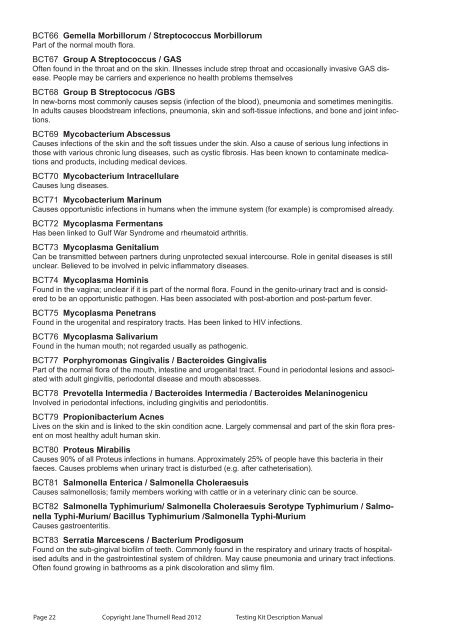You also want an ePaper? Increase the reach of your titles
YUMPU automatically turns print PDFs into web optimized ePapers that Google loves.
BCT66 Gemella Morbillorum / Streptococcus Morbillorum<br />
Part of the normal mouth flora.<br />
BCT67 Group A Streptococcus / GAS<br />
Often found in the throat and on the skin. Illnesses include strep throat and occasionally invasive GAS disease.<br />
People may be carriers and experience no health problems themselves<br />
BCT68 Group B Streptococus /GBS<br />
In new-borns most commonly causes sepsis (infection of the blood), pneumonia and sometimes meningitis.<br />
In adults causes bloodstream infections, pneumonia, skin and soft-tissue infections, and bone and joint infections.<br />
BCT69 Mycobacterium Abscessus<br />
Causes infections of the skin and the soft tissues under the skin. Also a cause of serious lung infections in<br />
those with various chronic lung diseases, such as cystic fibrosis. Has been known to contaminate medications<br />
and products, including medical devices.<br />
BCT70 Mycobacterium Intracellulare<br />
Causes lung diseases.<br />
BCT71 Mycobacterium Marinum<br />
Causes opportunistic infections in humans when the immune system (for example) is compromised already.<br />
BCT72 Mycoplasma Fermentans<br />
Has been linked to Gulf War Syndrome and rheumatoid arthritis.<br />
BCT73 Mycoplasma Genitalium<br />
Can be transmitted between partners during unprotected sexual intercourse. Role in genital diseases is still<br />
unclear. Believed to be involved in pelvic inflammatory diseases.<br />
BCT74 Mycoplasma Hominis<br />
Found in the vagina; unclear if it is part of the normal flora. Found in the genito-urinary tract and is considered<br />
to be an opportunistic pathogen. Has been associated with post-abortion and post-partum fever.<br />
BCT75 Mycoplasma Penetrans<br />
Found in the urogenital and respiratory tracts. Has been linked to HIV infections.<br />
BCT76 Mycoplasma Salivarium<br />
Found in the human mouth; not regarded usually as pathogenic.<br />
BCT77 Porphyromonas Gingivalis / Bacteroides Gingivalis<br />
Part of the normal flora of the mouth, intestine and urogenital tract. Found in periodontal lesions and associated<br />
with adult gingivitis, periodontal disease and mouth abscesses.<br />
BCT78 Prevotella Intermedia / Bacteroides Intermedia / Bacteroides Melaninogenicu<br />
Involved in periodontal infections, including gingivitis and periodontitis.<br />
BCT79 Propionibacterium Acnes<br />
Lives on the skin and is linked to the skin condition acne. Largely commensal and part of the skin flora present<br />
on most healthy adult human skin.<br />
BCT80 Proteus Mirabilis<br />
Causes 90% of all Proteus infections in humans. Approximately 25% of people have this bacteria in their<br />
faeces. Causes problems when urinary tract is disturbed (e.g. after catheterisation).<br />
BCT81 Salmonella Enterica / Salmonella Choleraesuis<br />
Causes salmonellosis; family members working with cattle or in a veterinary clinic can be source.<br />
BCT82 Salmonella Typhimurium/ Salmonella Choleraesuis Serotype Typhimurium / Salmonella<br />
Typhi-Murium/ Bacillus Typhimurium /Salmonella Typhi-Murium<br />
Causes gastroenteritis.<br />
BCT83 Serratia Marcescens / Bacterium Prodigosum<br />
Found on the sub-gingival biofilm of teeth. Commonly found in the respiratory and urinary tracts of hospitalised<br />
adults and in the gastrointestinal system of children. May cause pneumonia and urinary tract infections.<br />
Often found growing in bathrooms as a pink discoloration and slimy film.<br />
Page 22 Copyright Jane Thurnell Read 2012 Testing Kit Description Manual



